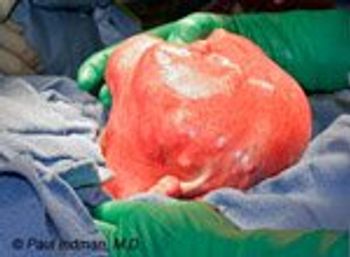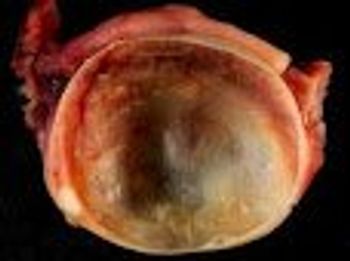
For patients who have no adverse effects from anesthesia, who says there are no palatable post-surgical food options?

For patients who have no adverse effects from anesthesia, who says there are no palatable post-surgical food options?

With this new FDA guidance, the group of women for whom laparoscopic power morcellation remains an appropriate treatment option is quite narrowed.

AAGL attendees are normally reserved, but on Wednesday they got on their feet to give an ovation to the doctor who engineered the first pregnancy in a woman with a transplanted uterus.

A panel of experts were bested only once at the “Stump the Professors” session at the 43rd AAGL Global Congress on Minimally Invasive Gynecology in Vancouver. A sarcoma was the diagnosis that got away among three complex cases presented to a packed audience.

An isolation bag for morcellation provides the best specimen containment, according to a study presented at AAGL.

Ever wonder about investing in 3D technology, the best candidates for LESS, and the utility of dual-function instruments? Here's one OB/GYN's opinion.

In this blog, one OB/GYN discusses her move from a hospital staff physician to a solo private practice, a decision that hasn't come without costs.

Two studies show that the emotional impact of uterine fibroids is significant but support is lacking, especially in African American women.

Studies of the impact of diet on risk of ovarian cancer are limited and their results unclear but a new report based on data from the Nurses’ Health Study (NHS) suggests a possible association between high intake of flavonoids and black tea and lower risk of the disease.

High doses of vitamin D may not help prevent recurrence of bacterial vaginosis (BV), according to results of a randomized controlled trial.

"Perhaps the last morcellator remaining in the market should be used to morcellate the tort system ..."

cfDNA gives insight into the pathogenesis of serious disease and early information about benign conditions.

Two experts discuss whether a DNA test can replace the Pap.

An aromatase inhibitor was safe for use in ovarian stimulation but produced fewer live births than a standard clomiphene citrate (CC) regimen, according to results of a multicenter trial.

New research looking at complication rates and cost for oophorectomy and cystectomy favors conventional laparoscopy over robotic surgery.

An analysis of data from nearly 90,000 women who underwent adnexal surgery over a 3-year period shows that robotically assisted procedures were associated with substantially higher costs and increases in intraoperative complications.

According to a recent study, low-dose oral bisphosphonates administered to prevent or treat postmenopausal osteoporosis may be associated with a lower risk of skeletal metastasis in patients with early- or more advanced-stage breast cancer.

A large, prospective study shows that teens ages 15 to 19 will use choose and use long-acting reversible contraceptives (LARCs) when they are educated about those methods and given them at no cost.

Results from a study of nearly 100,000 women suggest that increasing skirt size over a lifetime--a proxy for waist circumference-may be an indicator of increased risk of postmenopausal breast cancer.

According to a recent study in the Journal of the National Cancer Institute, the evidence continues to mount for an association between breastfeeding and reduced risk of aggressive breast cancers in African-American women.

Evidence is mounting that robotic surgeons of any training level show significant improvement after a formal skill assessment process.

Javier F Magrina, MD, demonstates the prevention of ureteral injury while performing an endoscopic hysterectomy.

When a jury sees a big corporation in the defendant’s chair, it can have an effect, although it is never a jury’s job to “punish” a corporation.

The big question is whether the robot improves outcomes in gynecologic surgery.

Certain patients are at increased risk of ureteral injury during endoscopic hysterectomy due to differences in anatomy. The right tools and techniques will protect them from injury and complications.